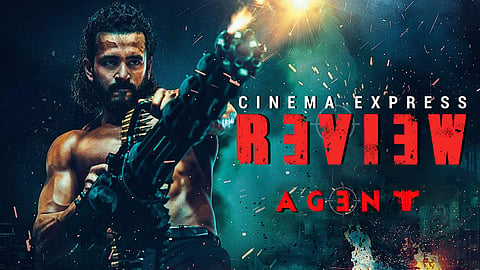

Ramakrishna alias Ricky (Akhil Akkineni), much like Karthi in last year’s Sardar has zero qualms about his family treating him like a slacker up to no good. He never provides an explanation, content with his family living in oblivion about his true aspirations. With a cheeky grin slapped across his face, he roams around town gathering intel on suspicious people in the hopes of being noticed by the Research & Analysis Wing (RAW), where he aspires to work someday. He even audaciously attends government job exams writing on the margins of his OMR sheets that he wants a job at the RAW, while declaring as a matter of fact that he is not interested in a desk job. After getting rejected thrice, he takes matters into his own hands to get his dream job one more time. While Telugu cinema is always game for fusing real-life details of a star into the fictitious character he is essaying, the unintentional parallels displayed in Akhil seeking a coveted break in the industry after a string of unsuccessful films, against Ricky’s sincere but less-than-legal attempts to get into this country’s elite intelligence force is not lost on me.
It is a little hard to explain the rest of Agent’s plot coherently, considering it flits from one point to another like a tiresome, fidgety teenager.
Cast - Akhil Akkineni, Mammootty, Dino Morea, Sakshi Vaidya
Director - Surender Reddy
There is a mismatch so severe in the film’s tone, Agent feels like the body of a run-of-the-mill Hollywood spy actioner is possessed with the spirit of a politically incorrect Telugu masala film, the kind Surender Reddy and his writer Vakkantham Vamsi thrive in. Look at Ricky’s relationship with Vidya (Sakshi Vaidya), for instance. There is a love at first sight on part of the former, followed by what sounds like a situationship in theory, only to have that inconsequential subplot (which is only rivaled by three out-of-place romantic numbers) get hijacked by our hero winning the heroine’s heart by threatening her harasser.
Much like John Abraham’s Jim in Pathaan, you get a villain with a grudge in Agent (Dino Morea), a man who considers terrorism based on religious fundamentalism as passe. Ideologues are mere pawns for The God (Dino Morea) and his organisation The Syndicate, a secret, Illuminati-like oligopoly who control everything from government to media and beyond. Contrast this with the way ‘Syndicate’ is used in Pushpa: The Rise. Any newfangled term in a film, irrespective of its specific connotations, is only as effective as the rest of its story. The writing of Agent, especially in its second half focuses on the unholy trinity of its three central characters — God, Devil and Ricky. It is interesting to note that the film’s stern do-gooder is called The Devil, while the film's antagonist is ‘The God’ here. We also get the backstory of Ricky and The Devil (Mammootty), which is pitted against the backstory of The Devil and The God. Ricky keeps shuttling from The God and The Devil, to confusing effect. While there is some noteworthy commentary on the difference between a good student/agent versus a bad one, all these nuanced, interpersonal dynamics never get woven into the story as they prominently should. We instead get a film with buzzwords like floating banks and sleeper cells, like empty shells on a scorched battlefield. Cinematographer Rasool Ellore lights the film with style and aplomb, trying to make up for the film’s lacklustre story with the brightest of explosions. Just as Agent manages to end on a sincere note on how heroes never die, on par with the film’s last act, we are also handed a post-credits sequence where the makers practically mock the film’s viewer by going, “You really thought we would kill the hero, did you? You fool.”
Akhil hams his way through Agent, with the audience never quite being able to believe the ‘elevations’ he receives throughout the film. Mammootty, while handsome and formidable, is saddled with a pithy, placecard role. The film continues its streak of jarring, half-hearted executions with the way it recreates New Delhi’s RAW office in Hyderabad’s Raidurgam, which would have at least worked if they did not display the bird’s eye B-roll of the same Raidurg area when they wanted to establish the story in Hyderabad.
There is a throwaway line comparing logic with magic somewhere in Agent, and the film falls short on both counts, leaving its viewer with a tedious and thoroughly unmemorable experience.